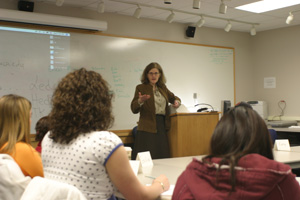Dianne Lynch, dean of the Roy H. Park School of Communications, and Mead Loop, chair of the journalism department, met with students Dec. 21 to announce initiatives aimed to improve the quality of the journalism department in response to student unrest.

In a Dec. 14 e-mail to journalism majors, Lynch acknowledged the department has been in “a state of flux” since her arrival in 2004. In Lynch’s inaugural year at the school, insufficient staffing and courses without professors marked the first week of classes.
Last spring, the dean commissioned a study of the journalism program by Janice Castro, the senior director of graduate education and teaching excellence of the Medill Journalism School at Northwestern University. Castro’s findings, which Lynch presented to the nearly 40 journalism students at the meeting, called for new faculty members and a revised curriculum.
Lynch said the hiring process for tenure-track professors, which has been ongoing for the past two years, is crucial to getting the curriculum off the ground. Last year’s search yielded two professors and has continued into this semester, she said.
Lynch said the department will hire at least two faculty members this spring.
“One of those I expect will be a Ph.D. and the other will be a professional,” she said.
Lynch said revisions of the curriculum were ongoing and she planned to meet with journalism faculty members this week to discuss proposals for the curriculum.
“[Some examples include] building courses into the program that emphasize narrative and storytelling across media types … and integrate ethics in ways we haven’t before,” Lynch said.
Loop said journalism professors will be meeting Saturday to discuss curriculum changes, but was unable to identify a specific date for the changes to take place.
The department will also add a Center for Independent Media, funded by the Park Foundation, that will focus on digital journalism and independent media. Lynch said the center will sponsor a national conference on independent media in the fall, and she aims to hire a director by June 1 so the program is in place next fall.
Rob Schroeder, a junior journalism and sport media double major, said he feels the situation has worsened during the past two and a half years, and the administration’s opportunity for improvement went “to the wayside.”
“This became a lost semester for me in my four years of journalism education,” he said. “One of the core problems is that it’s not providing what students need for a career in journalism when they graduate. … It needs to be more rigorous.”
Erika Spaet, a sophomore journalism and politics double major, said the true test will be the proposed changes becoming reality, but improvements need to be two-fold.
“A certain amount of the burden must be placed on the students and their work ethic,” Spaet said. “We’ve shown that we want change, which is the first step, but we have to follow through and make sure we’re active supporters of a reformed
department.”
The meeting came about after students in the journalism course “Issues in the News” dedicated last semester’s class to projects examining problems with their program.
Junior journalism major Dan Cassavaugh, one of four students who discussed their concerns with Loop after Thanksgiving break, said he has experienced a lack of organization in the department.
“Last semester I had one class that was particularly unacceptable to standards that I expect from Ithaca, and I voiced that to the chair of the department [Loop],” he said. “It was universal across the board, for at least the juniors in the journalism program.”
Suggestions generated by Cassavaugh and other students at the meeting include a student board who will meet monthly with Loop to discuss the program’s content, and midsemester evaluations to allow teachers to adjust their syllabi as necessary.
“One of the things I noticed at the meeting was there were lots of different student constituencies, each seeking its own voice in something,” Loop said. “So rather than organizing traditionally — one freshman, one sophomore, et cetera — we’re going to try to do it around what people are interested in.”
Cassavaugh said the group’s approach was received well by the administration.
“They thought it was great … we weren’t just saying ‘This person is horrible, this person should never teach’ — but [they] could be OK, that they need to do these things better,” he said. “Overall, from top to bottom, my take was that the administration was very receptive to what we had to say and listened and was genuine back to us.”







